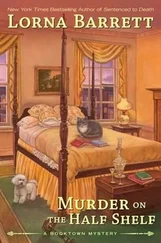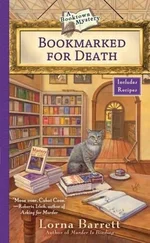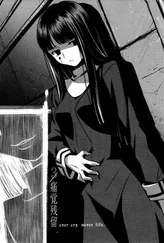“But perhaps Jim Roth’s greatest legacy was the lives he saved in battle,” Chauncey continued. “Those of you who knew Jim well will remember his exciting tales of fighting in the jungles of Vietnam. Yes, Jim was also a decorated war hero. Once, in a heated firefight, he single-handedly saved the lives of seven men in his battalion. He was awarded a number of medals, which he proudly displayed in his shop. The Bronze Star, the Silver Star, and, of course, the Purple Heart for being wounded in battle.
“We will miss Jim. His winning smile, his friendly ways, and most of all his big heart. Farewell, dear friend. May you rest in peace.” Chauncey folded his notes, placed them in his suit pocket, and stepped away from the microphone.
Frannie took a shuddering breath and composed herself before she stepped back to the microphone. “Thank you, Chauncey. That was lovely. And now, I believe Lois Kerr, Stoneham’s librarian, would like to say a few words about Jim and another of his legacies.”
Lois stepped forward, but before she could say a word, a voice from the back of the room pierced the quiet. “I have a few things to say, as well.”
Everyone turned as Livvie Roth entered the conference room, threading her way through the crowd. Clad in a stunningly loud, magenta floral dress, she seemed ill-dressed for a memorial service, and the dark expression covering her face was menacing enough to frighten small animals and children. This was not at all the sometimes sweet, little old lady Tricia had met previously.
Livvie stepped up to the microphone. She took a few moments to look each and every person in the room in the eye. “I, too, came here today to tell you about my son.” Mrs. Roth’s hard gaze raked her audience once again. “I heard what Ms. Armstrong said, that he was a kind and decent man. I listened with interest to Mr. Porter’s tall tales. But I’m here to tell you that James Winston Roth was a liar and a cad. He treated me, his own mother, like a servant. He took my money, kept me homebound, and even drove my car—not allowing me its use. He could never have become a teacher. Jim never even graduated high school. He learned much of what he knew about history from comic books and the Military Channel. He was a terrible businessman. His store was on the brink of bankruptcy through bad management and his gambling habit. Even Gamblers Anonymous couldn’t keep him away from the craps tables. Did you know about that?”
No one said a word, or even nodded. Several guests looked embarrassed. Had they known Jim from GA meetings? Tricia felt like a rubbernecker at a crash site, but she, too, could not look away.
“Worst of all, James lied about his military record,” Mrs. Roth continued. “He had none! He was declared Four-F by the Selective Service, and often bragged that if he hadn’t been found ineligible to serve, he would have escaped to Canada to dodge the draft. Those medals he displayed on the walls of his store were bought at an estate sale!”
Tricia looked around and saw mouths hanging open in shock and dismay.
“And you,” Mrs. Roth said with disgust, staring at Frannie. “When I heard it was you who’d set up this farce of a service, I was livid. How dare you prance around here in a wedding dress, talking about James as though he had any use for you?”
All eyes roved to Frannie, who stood stock still at the front of the room.
“This pitiable woman desperately wanted to believe James was going to marry her,” Mrs. Roth said with scorn. “Did she tell you he’d dumped her just days before his death?”
Captain Baker’s eyes narrowed. Frannie’s eyes widened in horror, and her jaw dropped.
“Yes,” Mrs. Roth continued, “that was the kind of man James Roth was. Dishonest, deceitful, and a bully to the end. It is the saddest thing a mother can say about her child, but the world is better off without him.”
And with that, she gave Frannie a parting glare and stepped away from the microphone. The mourners moved back, giving her plenty of space as she stalked out of the conference room.
A deadly silence followed her departure. The guests looked at each other in shared shock, all trying not to look at Frannie. For a terribly long moment, Frannie stood there, dumbfounded, and then she burst into tears. Grace, who was the closest, rushed to her side, but was pushed away as Frannie bolted from the room. Ginny ran after her, with Russ right on her heels.
Tricia sidled up to Captain Baker and whispered, “Looks like you’ve now got three suspects.”
Tricia had never seen a room clear out so fast. Within seconds of Frannie’s humiliated escape, most of the rest of the mourners grabbed their serving plates and scattered. Even the Dexter sisters gave up their petition quest and filed out after the others. Only Tricia, Mr. Everett, Grace, and Captain Baker remained to take in the chaos.
Ginny quickly returned. “I thought maybe Frannie had run to the bathroom to have a good cry, but I couldn’t find her. I looked in the parking lot, and her car’s gone.” She shook her head. “Boy, Mrs. Roth’s announcements were a bit of a shocker, weren’t they?”
“It certainly doesn’t sound like she’ll miss him,” Tricia agreed.
“But do you think it’s possible she might have killed her own son?” Ginny pressed.
“That’s infanticide,” Grace said, appalled.
“Jim was no baby,” Ginny said with a smirk.
Tricia frowned. “I have to admit Mrs. Roth is one strange duck. She’d started redecorating her home—removing Jim’s presence—before he’d even had a chance to be missed. That alone doesn’t make her look good.”
“Why didn’t you mention that before?” Baker asked.
She shrugged. “I guess I didn’t want her to look heartless. Then again . . . I entertained the thought she might’ve been poisoning Jim.”
“Poison?” It was Mr. Everett’s turn to be appalled.
“That first day I met her, she kind of creeped me out. She offered me a lemon bar cookie that had a strange, almost glowing yellow color. It reminded me of antifreeze. And then, not two days later, I saw a gallon jug of the stuff in her garage.”
“Many people store antifreeze. It doesn’t make them criminals,” Grace said.
Tricia turned to Captain Baker. “Did the medical examiner’s office do any toxicology tests on what was left of Jim?”
Baker looked uncertain. “They weren’t able to scrape up much—although I can certainly ask. But they wouldn’t have been looking for that kind of evidence, so there’s a possibility they didn’t do more than a DNA test to prove he’d died in the blast.”
“Tricia, you can’t be serious,” Grace chided. “No mother would kill her only child, no matter how bad a boy he was.” Tricia knew Grace spoke from experience, but there was plenty of evidence to the contrary.
“It depends on how abusive he was. She said Jim was a lifelong bully,” Ginny said.
“But that’s not the impression he gave his customers, or his friends at the Chamber of Commerce,” Tricia said in Jim’s defense. “There’s got to be some middle ground.”
“He lied about his military service,” Mr. Everett said, aghast.
“Don’t forget,” Ginny said, “we’ve now got another suspect: Frannie. ‘Hell hath no fury like a woman scorned,’ ” she quoted.
“Oh, dear,” Mr. Everett murmured. “Oh, dear, oh, dear.”
“I never knew they were dating. Do you think it’s true that Jim dropped her just days before he died?” Grace asked.
“Then why would she go to all the trouble of arranging this memorial service?” Ginny asked.
“To avert suspicion,” Baker answered. “I’ll be having a talk with both Mrs. Roth and Ms. Armstrong.” He nodded in Tricia’s direction. “If you’ll excuse me.”
Читать дальше











